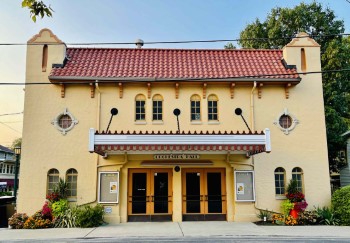CLS: World War II
From the leadership on the battlefield to the role of the press during the war, lectures this week will educate and inspire thinking about the many facets and outcomes related to World War II.
DR. CRAIG L. SYMONDS | Professor Emeritus of History at the United States Naval Academy
10:30 a.m.-12 p.m., Monday, June 27, Orchestra Hall | “The “Turkey Shoot” in the Philippine Sea”
10:30 a.m.-12 p.m., Tuesday, June 28, Orchestra Hall | “Bull’s Run” at Leyte Gulf

Tuesday’s presentation examines the “Bull’s Run” battle that occurred at Leyte Gulf, which was directed by William F. “Bull” Halsey. Halsey had a unique command personality which impacted the role of command and temperament in war. His style will be compared with that of Raymond Spruance who led the “Turkey Shoot” in the Philippines.
Dr. Craig L. Symonds is Professor Emeritus of history at the United States Naval Academy. During a 30-year teaching career there, he was the first person to win both the Academy’s “Excellence in Teaching” Award (1988) and its “Excellence in Research” Award (1998).
In 1994-1995, he was Professor of Strategy at the Britannia Royal Naval College in Dartmouth, England. From 2017-2020 he was The Ernest J. King Distinguished Professor of Maritime History at the U.S. Naval War College in Newport, Rhode Island, for which he received his fourth Superior Civilian Service Medal (2020).
Symonds is the author of 16 books. His book World War II at Sea: A Global History, which was published in 2018, has been translated into Spanish, French, Chinese and Polish. His newest book is a wartime biography of Admiral Chester Nimitz entitled Nimitz at War, (spring of 2022).
ALEX LOVELACE | Scholar in Residence at the Contemporary History Institute, Ohio University
3:30 p.m.-5 p.m., Monday, June 27, Orchestra Hall | “The Media Offensive: How the American Press Shaped Allied Strategy during World War”

For the U.S. military, the media was used to inspire soldiers, improve the morale of the home front, and influence public opinion to better serve the war effort. At the same time, the press and public opinion increasingly influenced the battlefield decisions of military commanders. By the end of the war, the media was playing a large role in the strategic and operational decisions of Allied generals.
Alexander Lovelace holds a master’s degree in military and American history from George Washington University, where he was awarded the Charles Herber Teaching Prize for Best Graduate Teaching Assistant in 2013.
His master’s thesis was Hughes’ War: The Allied High Command Through the Eyes of General Everett S. Hughes. Lovelace focuses mainly on Allied military leadership in World War II, along with military-media relations. His latest research and writing deal involve General George Patton and the American media. Lovelace is currently a Scholar in Residence at the Contemporary History Institute, Ohio University.
MIKE ROGERS
10:30 a.m.-12 p.m., Wednesday, June 29, Orchestra Hall | “Weapons of WWII Axis Countries “
The presentation will begin with an overview of select rifles and pistols of various countries that declared war on the US during World War II, or otherwise engaged in hostilities with the U.S. Japan, Germany, Italy, Bulgaria, Romania, and Thailand will be considered. The history of individual guns based on individual production date, proof marks, modifications, and known arms contracts will be presented followed by Q&A and an opportunity for hands-on inspection.
The Music of World War II
3:30-5 p.m., Wednesday, June 29, Orchestra Hall
The musical sounds of World War II shaped some of the most prolific music of the 20th Century, both in the country and around the world. Join musician and performer Michael Shirtz as he explores the performers and composers of the era, as well as the power behind the music as a source of healing, morale building, propaganda, and more. The influence of the war efforts brought great advancements to the music industry through records, radio, and motion pictures. From the Big Band music of Glenn Miller, Duke Ellington, Tommy Dorsey to the songs of the Andrew Sisters, Ella Fitzgerald, Bing Crosby, and more, walk down memory lane to the music of 1940s and the era’s influence on the music of today.
Lt. Col Harold Brown with Michael Shirtz |
3:30-5 p.m., Thursday, June 30, Orchestra Hall | A Conversation with Tuskegee Airman, Lt. Col. Harold Brown with Michael Shirtz

During the lecture, composer/performer Michael Shirtz joins Brown to discuss the creation of a new musical narrative about Brown’s life entitled, “To Rise Above.”
“To Rise Above,” inspired by Brown’s autobiography, “Keep Your Airspeed Up: The Story of a Tuskegee Airman,” will premiere at Hoover Auditorium at 7:30 p.m. Thursday, June 30. The session will include a video, Q&A and conversation with Brown. Copies of Brown’s autobiography will be available for purchase.
Minneapolis native and North High School graduate, Dr. Harold Brown is an original Tuskegee Airman who flew with the famed 332nd Fighter Group in World War II, our country’s first African American military pilots. He graduated from the Tuskegee Institute’s segregated pilot training program and was commissioned as an officer in the then U.S. Army Air Corps in 1944.
During his time in combat, Dr. Brown completed missions strafing targets on the ground and protecting bombers in the air. On his 30th mission, he was shot down over enemy territory, bailing out of his badly damaged P-51 and being taken as a prisoner of war.
Dr. Brown served his country for 23 years, including World War II. He retired in 1965 with the rank of Lieutenant Colonel, experienced in 20 different military aircraft and with a post at Strategic Air Command under his belt during the Cuban Missile Crisis.
JIM CRAFT | Oakland County (Michigan) Historical Commission
10:30 a.m.-12 p.m., Friday, July 1, Orchestra Hall | “D-Day”
While most people have a passing awareness of the events of June 6, 1944, popular presentations of D-Day rarely place it in the full context. Where did it fit in the grand scheme of the war in Europe? What was the overall strategy for the campaign and why were the Allies successful? What were the German advantages and disadvantages? What made the campaign in Northern France a long, costly one? What would have been the consequences of failure? What happened after June 6? How were the Americans able to breach the formidable barrier at Omaha beach? These and other questions are addressed in this presentation. It will focus on the American experience and make only cursory reference to the British role in the Normandy Campaign due to session time limitations.
Jim Craft has a bachelor’s in history from Oakland University (Rochester, MI) and a master’s in history from Wayne State University (Detroit, MI). After teaching history for 13 years, he moved into “corporate America” for the balance of his career.
Since 1995, however, he has been active in various historical projects: writing, researching, developing curriculum material, doing curatorial work, and lecturing. A frequent presenter in southeastern Michigan, he is currently writing a series of short history books. These primarily focus on important, although underappreciated, aspects of American history but doing so from a local perspective.
Craft’s primary expertise is in the 19th century; the Normandy Campaign is one of his many areas of interest, and he has visited Normandy on six occasions to explore the far-flung combat areas. Craft has been a member of the Oakland County (Michigan) Historical Commission since 2008.
The event is finished.
Date
- Jun 27, 2022 - Jul 01, 2022
- Expired!
Location

